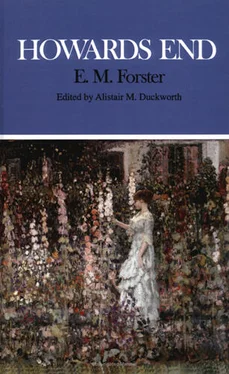Edward Morgan Forster - Howards End
Здесь есть возможность читать онлайн «Edward Morgan Forster - Howards End» весь текст электронной книги совершенно бесплатно (целиком полную версию без сокращений). В некоторых случаях можно слушать аудио, скачать через торрент в формате fb2 и присутствует краткое содержание. Жанр: Классическая проза, на английском языке. Описание произведения, (предисловие) а так же отзывы посетителей доступны на портале библиотеки ЛибКат.
- Название:Howards End
- Автор:
- Жанр:
- Год:неизвестен
- ISBN:нет данных
- Рейтинг книги:3 / 5. Голосов: 1
-
Избранное:Добавить в избранное
- Отзывы:
-
Ваша оценка:
- 60
- 1
- 2
- 3
- 4
- 5
Howards End: краткое содержание, описание и аннотация
Предлагаем к чтению аннотацию, описание, краткое содержание или предисловие (зависит от того, что написал сам автор книги «Howards End»). Если вы не нашли необходимую информацию о книге — напишите в комментариях, мы постараемся отыскать её.
Howards End — читать онлайн бесплатно полную книгу (весь текст) целиком
Ниже представлен текст книги, разбитый по страницам. Система сохранения места последней прочитанной страницы, позволяет с удобством читать онлайн бесплатно книгу «Howards End», без необходимости каждый раз заново искать на чём Вы остановились. Поставьте закладку, и сможете в любой момент перейти на страницу, на которой закончили чтение.
Интервал:
Закладка:
Certainly Oniton would take some digesting. It would be no small business to remain herself, and yet to assimilate such an establishment. She must remain herself, for his sake as well as her own, since a shadowy wife degrades the husband whom she accompanies; and she must assimilate for reasons of common honesty, since she had no right to marry a man and make him uncomfortable. Her only ally was the power of Home. The loss of Wickham Place had taught her more than its possession. Howards End had repeated the lesson. She was determined to create new sanctities among these hills.
After visiting the wine-cellar, she dressed, and then came the wedding, which seemed a small affair when compared with the preparations for it. Everything went like one o'clock. Mr. Cahill materialized out of space, and was waiting for his bride at the church door. No one dropped the ring or mispronounced the responses, or trod on Evie's train, or cried. In a few minutes—the clergymen performed their duty, the register was signed, and they were back in their carriages, negotiating the dangerous curve by the lych-gate. Margaret was convinced that they had not been married at all, and that the Norman church had been intent all the time on other business.
There were more documents to sign at the house, and the breakfast to eat, and then a few more people dropped in for the garden party. There had been a great many refusals, and after all it was not a very big affair—not as big as Margaret's would be. She noted the dishes and the strips of red carpet, that outwardly she might give Henry what was proper. But inwardly she hoped for something better than this blend of Sunday church and fox-hunting. If only someone had been upset! But this wedding had gone off so particularly well—"quite like a Durbar" in the opinion of Lady Edser, and she thoroughly agreed with her.
So the wasted day lumbered forward, the bride and bridegroom drove off, yelling with laughter, and for the second time the sun retreated towards the hills of Wales. Henry, who was more tired than he owned, came up to her in the castle meadow, and, in tones of unusual softness, said that he was pleased. Everything had gone off so well. She felt that he was praising her, too, and blushed; certainly she had done all she could with his intractable friends, and had made a special point of kowtowing to the men. They were breaking camp this evening: only the Warringtons and quiet child would stay the night, and the others were already moving towards the house to finish their packing. "I think it did go off well," she agreed. "Since I had to jump out of the motor, I'm thankful I lighted on my left hand. I am so very glad about it, Henry dear; I only hope that the guests at ours may be half as comfortable. You must all remember that we have no practical person among us, except my aunt, and she is not used to entertainments on a large scale."
"I know," he said gravely. "Under the circumstances, it would be better to put everything into the hands of Harrod's or Whiteley's, or even to go to some hotel."
"You desire a hotel?"
"Yes, because—well, I mustn't interfere with you. No doubt you want to be married from your old home."
"My old home's falling into pieces, Henry. I only want my new. Isn't it a perfect evening—"
"The Alexandrina isn't bad—"
"The Alexandrina," she echoed, more occupied with the threads of smoke that were issuing from their chimneys, and ruling the sunlit slopes with parallels of grey.
"It's off Curzon Street."
"Is it? Let's be married from off Curzon Street."
Then she turned westward, to gaze at the swirling gold. Just where the river rounded the hill the sun caught it. Fairyland must lie above the bend, and its precious liquid was pouring towards them past Charles's bathing-shed. She gazed so long that her eyes were dazzled, and when they moved back to the house, she could not recognize the faces of people who were coming out of it. A parlour-maid was preceding them.
"Who are those people?" she asked.
"They're callers!" exclaimed Henry. "It's too late for callers."
"Perhaps they're town people who want to see the wedding presents."
"I'm not at home yet to townees."
"Well, hide among the ruins, and if I can stop them, I will."
He thanked her.
Margaret went forward, smiling socially. She supposed that these were unpunctual guests, who would have to be content with vicarious civility, since Evie and Charles were gone, Henry tired, and the others in their rooms. She assumed the airs of a hostess; not for long. For one of the group was Helen—Helen in her oldest clothes, and dominated by that tense, wounding excitement that had made her a terror in their nursery days.
"What is it?" she called. "Oh, what's wrong? Is Tibby ill?"
Helen spoke to her two companions, who fell back. Then she bore forward furiously.
"They're starving!" she shouted. "I found them starving!"
"Who? Why have you come?"
"The Basts."
"Oh, Helen!" moaned Margaret. "Whatever have you done now?"
"He has lost his place. He has been turned out of his bank. Yes, he's done for. We upper classes have ruined him, and I suppose you'll tell me it's the battle of life. Starving. His wife is ill. Starving. She fainted in the train."
"Helen, are you mad?"
"Perhaps. Yes. If you like, I'm mad. But I've brought them. I'll stand injustice no longer. I'll show up the wretchedness that lies under this luxury, this talk of impersonal forces, this cant about God doing what we're too slack to do ourselves."
"Have you actually brought two starving people from London to Shropshire, Helen?"
Helen was checked. She had not thought of this, and her hysteria abated. "There was a restaurant car on the train," she said.
"Don't be absurd. They aren't starving, and you know it. Now, begin from the beginning. I won't have such theatrical nonsense. How dare you! Yes, how dare you!" she repeated, as anger filled her, "bursting in to Evie's wedding in this heartless way. My goodness! but you've a perverted notion of philanthropy. Look"—she indicated the house—"servants, people out of the windows. They think it's some vulgar scandal, and I must explain, 'Oh no, it's only my sister screaming, and only two hangers-on of ours, whom she has brought here for no conceivable reason.'"
"Kindly take back that word 'hangers-on,'" said Helen, ominously calm.
"Very well," conceded Margaret, who for all her wrath was determined to avoid a real quarrel. "I, too, am sorry about them, but it beats me why you've brought them here, or why you're here yourself.
"It's our last chance of seeing Mr. Wilcox."
Margaret moved towards the house at this. She was determined not to worry Henry.
"He's going to Scotland. I know he is. I insist on seeing him."
"Yes, tomorrow."
"I knew it was our last chance."
"How do you do, Mr. Bast?" said Margaret, trying to control her voice. "This is an odd business. What view do you take of it?"
"There is Mrs. Bast, too," prompted Helen.
Jacky also shook hands. She, like her husband, was shy, and, furthermore, ill, and furthermore, so bestially stupid that she could not grasp what was happening. She only knew that the lady had swept down like a whirlwind last night, had paid the rent, redeemed the furniture, provided them with a dinner and breakfast, and ordered them to meet her at Paddington next morning. Leonard had feebly protested, and when the morning came, had suggested that they shouldn't go. But she, half mesmerized, had obeyed. The lady had told them to, and they must, and their bed-sitting-room had accordingly changed into Paddington, and Paddington into a railway carriage, that shook, and grew hot, and grew cold, and vanished entirely, and reappeared amid torrents of expensive scent. "You have fainted," said the lady in an awe-struck voice. "Perhaps the air will do you good." And perhaps it had, for here she was, feeling rather better among a lot of flowers.
Читать дальшеИнтервал:
Закладка:
Похожие книги на «Howards End»
Представляем Вашему вниманию похожие книги на «Howards End» списком для выбора. Мы отобрали схожую по названию и смыслу литературу в надежде предоставить читателям больше вариантов отыскать новые, интересные, ещё непрочитанные произведения.
Обсуждение, отзывы о книге «Howards End» и просто собственные мнения читателей. Оставьте ваши комментарии, напишите, что Вы думаете о произведении, его смысле или главных героях. Укажите что конкретно понравилось, а что нет, и почему Вы так считаете.












